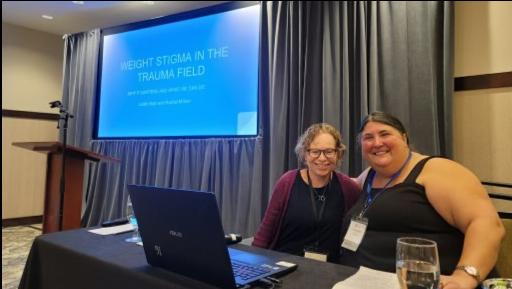
Dear Therapists,
When clients or patients seek out your care, they are putting a lot of trust in you to help them as they heal from their traumas. The trauma field has a history of anti-fat bias and anti-fatness, which according to Audrey Gordon (p.10 )[1] “…are umbrella terms that describe the attitudes, behaviors, and social systems that specifically marginalize, exclude, underserve and oppress fat bodies. They refer both to individual bigotry as well as institutional policies designed to marginalize fat people.” This letter is an offering of what your higher weight clients and patients need you to know in order to provide affirming and ethical care:
Fat bodies have always existed and will always exist. Fatness is not a sign of pathology and not something that needs to be changed. In fact, trying to do so is not only not possible; it’s harmful
Anti-fat bias or weight stigma is traumatic. When fat people are told to lose weight, told their body isn’t acceptable, are stigmatized about their body size, are bullied about their body size, etc., that is a trauma
Fatness is not a sign of trauma. Many fat people have no trauma history and many do, just as many thinner people have no history of trauma, and many do.
When working with fat clients who have a trauma history, weight loss should never be expected or a treatment goal. Fat clients who heal from trauma will typically remain fat clients. (Unless they do something disordered to lose weight. Fat people are often prescribed behaviors that are considered eating disordered in thinner people.)
Familiarize yourself with the physiology of weight loss and the decades worth of research that finds 1) there is no proven way for the vast majority of people to sustain weight loss and 2) weight cycling, often known as yo-yo dieting, increases body size over time, with one-third to two thirds of dieters ending up higher than their pre-diet weight. This is to acknowledge that dieting changes a person’s physiology; there is nothing wrong with being fat.[2]
People of all different body sizes can have all different eating disorders. When you are working with a fat person who has an eating disorder do not assume that they have binge eating disorder. If they do have binge eating disorder, which does have a higher association with complex trauma, do not mistake weight for a behavior (and remember that binge eating disorder usually includes restriction).
Fat people can have “atypical” anorexia, which is anorexia in a higher weight body. They are actually malnourished and their bodies need renourishment, not prescriptions or congratulations for weight loss.
Do not talk about your own dieting behavior, dislike of your own body, fear of weight gain, etc. in front of your clients, especially your fat clients. This is anti-fat bias and will be harmful for all of your clients.
Do your own work to unpack your anti-fat bias. It’s not possible to live in this culture and not have anti-fat bias. Address yours so you don’t project it onto your clients. It will make you a better provider.
Language matters. The words “obese” and “overweight” are shame-based. If fat clients find the word “fat” triggering because of how it’s been used to shame them, neutral terms such as “higher weight” may be used.
Remember that clients of all sizes might come to your office and ask for help losing weight. Some fat clients may even say that they want help treating their trauma so that they can lose weight. Be clear in communicating that weight loss is not something you can help them with or focus on. Instead, you can help them treat their trauma and support them in taking care of their bodies, without a focus on weight loss.
If you cannot work with fat clients in an affirming and fat positive way, acknowledge your own limitations to the client so they do not blame themselves. It is better to be honest and refer fat clients to someone who can provide them affirming treatment than to attempt to treat them yourself.
Please carefully consider each of these items before working with fat clients. We know that you went into the trauma field to help people heal from trauma. Considering the above when making treatment decisions will decrease the likelihood of you harming your fat clients.
We’ve all been raised in diet culture, and anti-fat bias needs to be unlearned. We’ve included some helpful resources beneath our signature.
9th Annual Weight Stigma Conference
June 28-29th, Denver Colorado
Weight Stigma in the Trauma Field: Why it Happens & What We Can Do
Presented by: Judith Matz, LCSW & Rachel Millner, Psy.D.
Special thanks to conference attendees for their valuable input
RESOURCES:
Aubrey Gordon: What we Don’t Talk About When we Talk About Fat (2020)
Christy Harrison: Anti-Diet: Reclaim Your Time, Money, Well-Being and Happiness
Through Intuitive Eating (2019)
DaShaun Harrison: Belly of the Beast: The Politics of Anti-Fatness as Anti-Blackness (2021)
Judith Matz: Unlearning Weight Stigma: The Latest Science on Weight and Trauma (Psychotherapy Networker, January/February 2022)
Sabrina Strings: Fearing the Black Body: the Racial Origins of Fat Phobia (2019)
Implicit Bias Test: https://implicit.harvard.edu/implicit/selectatest.html
This letter may be reproduced in its entirety
© 2023.
[1]Gordon, A. (2020). What we don’t talk about when we talk about fat. Beacon Press
[2] Tylka TL, Annunziato RA, Burgard D, Daníelsdóttir S, Shuman E, Davis C, Calogero RM. The weight-inclusive versus weight-normative approach to health: evaluating the evidence for prioritizing well-being over weight loss. J Obes. 2014;2014:983495. doi: 10.1155/2014/983495. Epub 2014 Jul 23. PMID: 25147734; PMCID: PMC4132299.